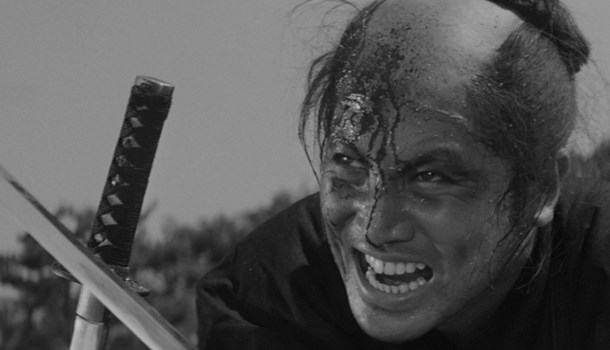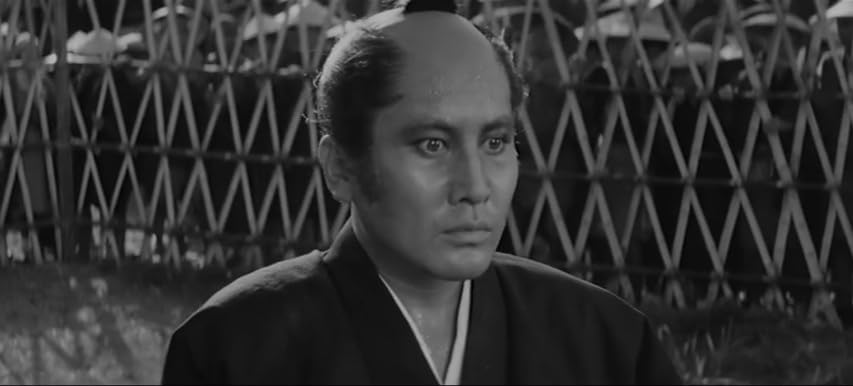
Written by Richard Durrance on 30 Jun 2023
Distributor Eureka Masters of Cinema • Certificate 15 • Price £18.99
Tadashi Imai’s 1964 jidaigeki, Revenge, finally came to our shores courtesy of Eureka’s Masters of Cinema. As did the heat, so my brain being too hot to think stopped me even considering spinning the disc. Then the heat settled a little and the brain, as best as it ever is, thought the time is now.
Young, impetuous and proud samurai, Shinpachi (Kinnosuke Nakamura) takes issue with a passing comment on the dullness of a spear owned by the clan’s mounted guard, of which he has recently joined. An impromptu, illegal duel follows, the results of which snowball out of control leading up to a final, vengeful duel orchestrated by Shinpachi's clan.
After a stretch of years, I’d recently rewatched Masaki Kobayashi’s Harakiri, a film also penned by the same screenwriter and Akira Kurosawa collaborator, Shinobu Hashimoto. Like Harakiri, Revenge is a film that is a scathing attack on feudal Japan, and feels like a companion piece to Kobayashi’s film. That said it did not feel as successful a film as Harakiri as it hasn’t the same power, though to be fair Harakiri is a pretty remarkable film.
Part of this feels structural and perhaps also, and against my normal prejudice, it might have been more successful if it were a much longer film, as Harakiri is. The first half of the film is told in a series of flashbacks (often within flashbacks) with the story unfolding while intercut with scenes of preparation for the duel. Starting from the building of an enclosure to the increasing circus of money-grabbing as the build-up to the vengeful duel brings out the worst avarice and clan politics. The narrative flows between various characters belonging to the two main families affected by the duel, as well as the sheriff and minister of the clan, not to mention the Buddhist priest that shelters Shinpachi. It’s effectively done but the fractured nature of the story means that much of what occurs is about setting up the background to the eventual showdown and there’s never quite enough characterisation to fully engage you. Shinpachi as the nominal protagonist is never quite the sympathetic figure that you might hope for, so until the duel finally appears it’s hard to engage with him as a person. To avoid sanction and punishment for his family, initially Shinpachi is excused as insane, and then in fear of reprisal for most of the film is on the verge of terrified insanity, unfortunately rendering Shinpachi a frustrating lead because also his samurai pride at winning his duel seemingly allows him to ignore the harm he’s unleashed. More sympathetic is his brother, Jubei (Takahiro Tamura), who is trying to stop his family from losing its stipend. The same is true of the family of the duel's loser, and again, you feel there is more in the performance of Tetsuro Tamba as Shume Okuno, who like Shinpachi after the initial insult allows his wounded pride and the laughter of his peers to push him towards violence that further escalates the clan’s already precarious position.

The reality of the duel hitting home
Where Harakiri manages to balance character and satire, and always set against Kobayashi’s often magisterial direction, Revenge feels a bit rushed, and as appreciative as I was of the satire, I felt I needed more of a connection to the characters. Nakamura as Shinpachi, admittedly, acts the part very well, but as I still leaned toward being more sympathetic with other characters, including the priest who has to shelter him, and his betrothed, Ritsu. The narrative also often has Shinpachi acting in ways that lessen our sympathy for him but I think to an extent this is intentional because the film focusses on Shinpachi in such a way that means the impact of the original duel, the political machinations that then take place, Shinpachi becomes a vehicle to see the human impact. It’s not a bad concept but it’s not always going to mean you can easily empathise with him.
That said, the film though becomes more focused and more riveting in its second half. The duel, when it occurs, is undeniably powerful. Shinpachi and his brother arriving at the hastily erected arena to the braying mob spitting watermelon-pips and insults has a visceral impact to it that is then exceeded once the duel begins, and the full hypocrisy of those that lead the clan becomes clearer. As endings go, even though you know much of what is about to happen, it exceeds expectations. The worst that you expect multiplies and Shinpachi feels noble against the backdrop of what befalls him. What’s more is how the film makes you realise that the fallout from this is likely another story, a film untold, a clan soon to dissipate under the weight of mistaken loyalty, corruption and incompetence. As a culmination of a critique of feudal Japanese society it’s an absolutely stunning conclusion and arguably some of my issues with the first half of the film are necessary when it comes to the end, as some of the smaller side characters you recognise being part of the duel, complicit even if tangentially are also deeply damaged by it. There are no victors here.
Yet Harakiri managed the same feat but with a stronger emotional connection to the characters and that for me was a real issue. I struggled through parts of the first half, desperately wanting to be more connected to my protagonists than I was even if the film ends brilliantly. Then again, the satire often requires that the samurai sense of wounded pride means actions are rash and the impacts emotionally conflicted, not to mention their perceived importance of status, as well the familial need to retain stipends that could so easily be taken away from them by those in power, who themselves venially consider such actions.
Yet the film is almost faultlessly performed, Temba as Shume Okuno gives a nuanced view of wounded samurai pride caught between revenge and familial advantage feels the most standout to me, excepting Nakamura as Shinpachi at the end, his horrified recognition of the reality of what the vengeful duel has become has a nightmarish quality to it.
If perhaps not the stone-cold classic I hoped for, Revenge nevertheless has moments of frustration and brilliance that means at its absolute best its immensely powerful, yet its lack of full connection between audience and characters renders the first half a touch frustrating. Yet I suspect many will feel differently about the film and engage with aspects more deeply than I did.

Long-time anime dilettante and general lover of cinema. Obsessive re-watcher of 'stuff'. Has issues with dubs. Will go off on tangents about other things that no one else cares about but is sadly passionate about. (Also, parentheses come as standard.) Looks curiously like Jo Shishido, hamster cheeks and all.
posted by Richard Durrance on 12 Feb 2026
posted by Richard Durrance on 10 Feb 2026
posted by Richard Durrance on 07 Feb 2026
posted by Richard Durrance on 03 Feb 2026
posted by Richard Durrance on 27 Jan 2026
posted by Richard Durrance on 19 Jan 2026
posted by Richard Durrance on 08 Jan 2026
posted by Richard Durrance on 17 Dec 2025